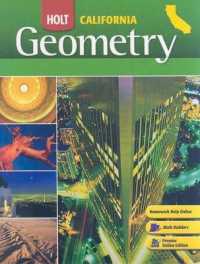- ホーム
- > 洋書
- > 英文書
- > Computer / General
基本説明
'...provides excellent examples of how theory and practice should go hand in hand to build a rigorous new research paradigm.' Yukio Tono, Professor of Foreign Studies, Tokyo University, Japan.
Full Description
Covers the state-of-the-art in e-lexicography, looking at current topics, themes, issues and research in an increasingly important field. This book looks at current research and future directions in e-lexicography. Online dictionaries and reference tools are increasingly prevalent in a digitized and internet-led era in language study that has embraced computational linguistics. This book responds with theoretical and practical analysis of key topics, from a global range of contributors. Since COBUILD in the 1980s, lexicographers have found it essential to engage with and utilize electronic computational tools. Internet dictionaries, online reference tools and even search engine optimization demand a knowledge of electronic lexicography and force a reassessment of the field. This volume looks at, amongst other topics: polyfunctional versus monofunctional dictionary tools; developing theories of lexicography for electronic mediums; distinguishing between the database and the dictionary; and, online dictionaries not as data repositories but as sophisticated search engines. This volume will appeal to scholars in lexicography and to practicing lexicographers.
Contents
Part I:Lexicography and the InternetConstruction of Internet Dictionaries; Introduction: The Construction of Internet Dictionaries, Pedro A. Fuertes-Olivera & Henning Bergenholtz; 1. Learning, Unlearning and Innovation in the Planning of Electronic Dictionaries, Rufus H. Gouws; 2. Access to and Presentation of Needs-adapted Data in Monofunctional Internet Dictionaries, Henning Bergenholtz; 3. Lexicographical and Other e-Tools for Consultation Purposes: Towards the Individualization of Needs Satisfaction, Sven Tarp; 4. Filtering and Adapting Data and Information in the Online Environment in Response to User Needs, Theo Bothma; 5. A Multi-layer Architecture for "Pluri-monofunctional" Dictionaries, Dennis Spohr; 6 Change of Paradigm: From Linguistics to Information Science and from Dictionaries to Lexicographic Information Tools, Patrick Leroyer; Part II: Internet Reference Tools; 7. From Data to Dictionary, Sandro Nielsen & Richard Almind; 8. Internet Dictionaries for Cognitive and Communicative Functions: El Diccionario Ingles-Espanol de Contabilidad, Pedro A. Fuertes-Olivera & Marta Nino-Amo; 9 A Dictionary is a Tool, a Good Dictionary is a Monofunctional Tool, Henning Bergenholtz & Inger Bergenholtz; 10. The Technical Realization of Three Monofunctional Phrasal Verb Dictionaries, Birger Andersen & Richard Almind; 11 Online Dictionaries of English, Robert Lew; 12 E-Dictionaries in the Information Age: The Lexical Constellation Model (LCM) and the Definitional Construct, Aquilino Sanchez & Pascual Cantos; 13. Modeling Interactive Reading, Translation and Writing Assistants, Serge Verlinde; 14. Electronic Dictionaries as Tools: Towards an Assessment of Usability, Ulrich Heid; 15. Conclusions: 10 Key Issues in e-Lexicography for the Future, Eva Samaniego Fernandez & Beatriz Perez Cabello de Alba; References; Index; Notes on Contributors.







